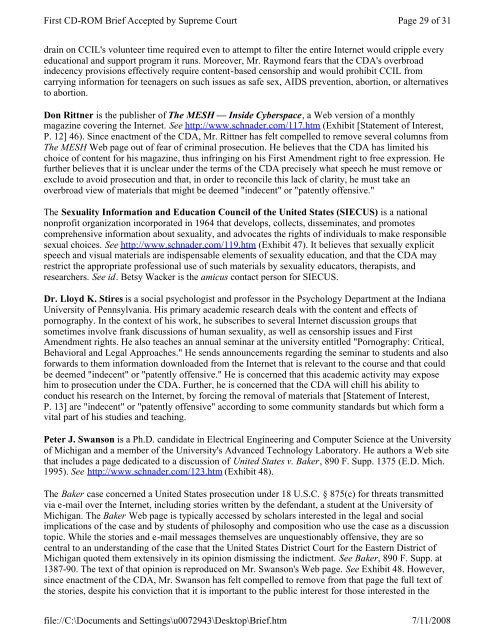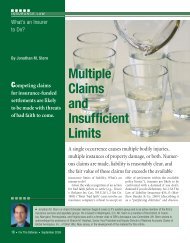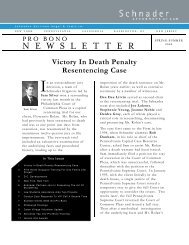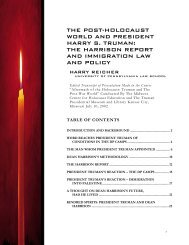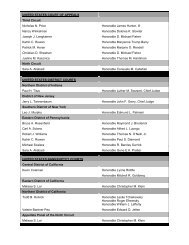Filed the first CD-ROM brief in the U.S. Supreme Court - Schnader ...
Filed the first CD-ROM brief in the U.S. Supreme Court - Schnader ...
Filed the first CD-ROM brief in the U.S. Supreme Court - Schnader ...
Create successful ePaper yourself
Turn your PDF publications into a flip-book with our unique Google optimized e-Paper software.
First <strong>CD</strong>-<strong>ROM</strong> Brief Accepted by <strong>Supreme</strong> <strong>Court</strong><br />
Page 29 of 31<br />
dra<strong>in</strong> on CCIL's volunteer time required even to attempt to filter <strong>the</strong> entire Internet would cripple every<br />
educational and support program it runs. Moreover, Mr. Raymond fears that <strong>the</strong> <strong>CD</strong>A's overbroad<br />
<strong>in</strong>decency provisions effectively require content-based censorship and would prohibit CCIL from<br />
carry<strong>in</strong>g <strong>in</strong>formation for teenagers on such issues as safe sex, AIDS prevention, abortion, or alternatives<br />
to abortion.<br />
Don Rittner is <strong>the</strong> publisher of The MESH — Inside Cyberspace, a Web version of a monthly<br />
magaz<strong>in</strong>e cover<strong>in</strong>g <strong>the</strong> Internet. See http://www.schnader.com/117.htm (Exhibit [Statement of Interest,<br />
P. 12] 46). S<strong>in</strong>ce enactment of <strong>the</strong> <strong>CD</strong>A, Mr. Rittner has felt compelled to remove several columns from<br />
The MESH Web page out of fear of crim<strong>in</strong>al prosecution. He believes that <strong>the</strong> <strong>CD</strong>A has limited his<br />
choice of content for his magaz<strong>in</strong>e, thus <strong>in</strong>fr<strong>in</strong>g<strong>in</strong>g on his First Amendment right to free expression. He<br />
fur<strong>the</strong>r believes that it is unclear under <strong>the</strong> terms of <strong>the</strong> <strong>CD</strong>A precisely what speech he must remove or<br />
exclude to avoid prosecution and that, <strong>in</strong> order to reconcile this lack of clarity, he must take an<br />
overbroad view of materials that might be deemed "<strong>in</strong>decent" or "patently offensive."<br />
The Sexuality Information and Education Council of <strong>the</strong> United States (SIECUS) is a national<br />
nonprofit organization <strong>in</strong>corporated <strong>in</strong> 1964 that develops, collects, dissem<strong>in</strong>ates, and promotes<br />
comprehensive <strong>in</strong>formation about sexuality, and advocates <strong>the</strong> rights of <strong>in</strong>dividuals to make responsible<br />
sexual choices. See http://www.schnader.com/119.htm (Exhibit 47). It believes that sexually explicit<br />
speech and visual materials are <strong>in</strong>dispensable elements of sexuality education, and that <strong>the</strong> <strong>CD</strong>A may<br />
restrict <strong>the</strong> appropriate professional use of such materials by sexuality educators, <strong>the</strong>rapists, and<br />
researchers. See id. Betsy Wacker is <strong>the</strong> amicus contact person for SIECUS.<br />
Dr. Lloyd K. Stires is a social psychologist and professor <strong>in</strong> <strong>the</strong> Psychology Department at <strong>the</strong> Indiana<br />
University of Pennsylvania. His primary academic research deals with <strong>the</strong> content and effects of<br />
pornography. In <strong>the</strong> context of his work, he subscribes to several Internet discussion groups that<br />
sometimes <strong>in</strong>volve frank discussions of human sexuality, as well as censorship issues and First<br />
Amendment rights. He also teaches an annual sem<strong>in</strong>ar at <strong>the</strong> university entitled "Pornography: Critical,<br />
Behavioral and Legal Approaches." He sends announcements regard<strong>in</strong>g <strong>the</strong> sem<strong>in</strong>ar to students and also<br />
forwards to <strong>the</strong>m <strong>in</strong>formation downloaded from <strong>the</strong> Internet that is relevant to <strong>the</strong> course and that could<br />
be deemed "<strong>in</strong>decent" or "patently offensive." He is concerned that this academic activity may expose<br />
him to prosecution under <strong>the</strong> <strong>CD</strong>A. Fur<strong>the</strong>r, he is concerned that <strong>the</strong> <strong>CD</strong>A will chill his ability to<br />
conduct his research on <strong>the</strong> Internet, by forc<strong>in</strong>g <strong>the</strong> removal of materials that [Statement of Interest,<br />
P. 13] are "<strong>in</strong>decent" or "patently offensive" accord<strong>in</strong>g to some community standards but which form a<br />
vital part of his studies and teach<strong>in</strong>g.<br />
Peter J. Swanson is a Ph.D. candidate <strong>in</strong> Electrical Eng<strong>in</strong>eer<strong>in</strong>g and Computer Science at <strong>the</strong> University<br />
of Michigan and a member of <strong>the</strong> University's Advanced Technology Laboratory. He authors a Web site<br />
that <strong>in</strong>cludes a page dedicated to a discussion of United States v. Baker, 890 F. Supp. 1375 (E.D. Mich.<br />
1995). See http://www.schnader.com/123.htm (Exhibit 48).<br />
The Baker case concerned a United States prosecution under 18 U.S.C. § 875(c) for threats transmitted<br />
via e-mail over <strong>the</strong> Internet, <strong>in</strong>clud<strong>in</strong>g stories written by <strong>the</strong> defendant, a student at <strong>the</strong> University of<br />
Michigan. The Baker Web page is typically accessed by scholars <strong>in</strong>terested <strong>in</strong> <strong>the</strong> legal and social<br />
implications of <strong>the</strong> case and by students of philosophy and composition who use <strong>the</strong> case as a discussion<br />
topic. While <strong>the</strong> stories and e-mail messages <strong>the</strong>mselves are unquestionably offensive, <strong>the</strong>y are so<br />
central to an understand<strong>in</strong>g of <strong>the</strong> case that <strong>the</strong> United States District <strong>Court</strong> for <strong>the</strong> Eastern District of<br />
Michigan quoted <strong>the</strong>m extensively <strong>in</strong> its op<strong>in</strong>ion dismiss<strong>in</strong>g <strong>the</strong> <strong>in</strong>dictment. See Baker, 890 F. Supp. at<br />
1387-90. The text of that op<strong>in</strong>ion is reproduced on Mr. Swanson's Web page. See Exhibit 48. However,<br />
s<strong>in</strong>ce enactment of <strong>the</strong> <strong>CD</strong>A, Mr. Swanson has felt compelled to remove from that page <strong>the</strong> full text of<br />
<strong>the</strong> stories, despite his conviction that it is important to <strong>the</strong> public <strong>in</strong>terest for those <strong>in</strong>terested <strong>in</strong> <strong>the</strong><br />
file://C:\Documents and Sett<strong>in</strong>gs\u0072943\Desktop\Brief.htm<br />
7/11/2008


